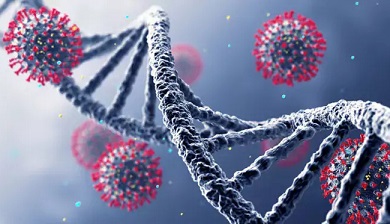SARS-CoV-2 Research: Scientists Uncover That SARS-CoV-2 UTR’s Intrudes Host RBP’s and Modulates Cellular Splicing Leading To Altered Gene Regulation
SARS-CoV-2 Research: Scientists from All India Institute of Medical Sciences-New Delhi, University of Nebraska-USA and NCR Biotech Science Cluster, Faridabad-India have in a new study found that SARS-CoV-2 UTR’s intrudes host RBP’s and modulates cellular splicing leading to altered gene regulation.

SARS-CoV-2, the virus responsible for COVID-19, has infected millions worldwide. To better understand the virus, scientists are examining how it interacts with human cells and affects gene regulation.
One area of investigation is the way the virus affects pre-mRNA splicing, a process that helps regulate gene expression in our cells. By looking at specific parts of the virus, called untranslated regions (UTRs), and their interactions with cellular proteins, the study team hopes to gain insights into the mechanisms of the virus and how it causes disease.
What is pre-mRNA splicing?
In eukaryotic cells, such as those found in humans, gene expression is tightly regulated. Before a gene can be translated into a protein, the non-coding segments called introns must be removed from precursor messenger RNAs (pre-mRNA) through a process called splicing, leaving behind the coding segments, called exons. Splicing takes place in a large RNA-protein complex called the spliceosome. This process is essential for gene expression and many cellular processes.
RNA splicing is an important process that contributes to the diversity of proteins in our bodies and is involved in various diseases, including cancer and atherosclerosis.
Viral infections can cause changes in the splicing events of host cells, either due to the virus directly interfering with the process or because of changes in the host's cellular environment. This can lead to disruptions in gene regulation and, in some cases, the development of diseases.
How does SARS-CoV-2 affect gene regulation?
SARS-CoV-2 is an RNA virus, which means it relies on the host cell's machinery for its life cycle. The virus can interact with host proteins and RNA molecules, potentially affecting the host's cellular processes. In the case of SARS-CoV-2, studies have shown that the virus can cause a reduction in mRNA levels, possibly by affecting pre-mRNA splicing. This could be one way the virus manipulates host cells to its advantage.
SARS-CoV-2's untranslated regions (UTRs)
The SARS-CoV-2 virus has two untranslated regions or UTRs, one at the beginning (5' UTR) and one at the end (3' UTR) of its RNA genome.
These UTRs play crucial roles in the virus's life cycle, such as RNA synthesis and protein expression. They can also interact with host RBPs (RNA-binding proteins), potentially altering the host's cellular processes.
The
SARS-CoV-2 Research team found that SARS-CoV-2 infection and the overexpression of the 5' and 3' UTRs can result in reduced mRNA levels in host cells, potentially due to altered pre-mRNA splicing.
The study team also used
computational tools to predict which RBPs might interact with the 5' and 3' UTRs. They found that many RBPs indeed interact with the UTRs and may be involved in modulating various molecular mechanisms, including pre-mRNA splicing. Interestingly, the 3' UTR appears to have a more pronounced effect on mRNA levels compared to the 5' UTR, suggesting that it may play a larger role in modulating pre-mRNA splicing.
Interactions between SARS-CoV-2 UTRs and host RBPs
Using in-silico approaches, the study team identified several host RBPs that may interact with SARS-CoV-2 UTRs. These interactions could be involved in modulating various molecular mechanisms, including pre-mRNA splicing. For example, the 3' UTR appears to interact with splicing factors such as PM14, MGN2, and MGN, which play crucial roles in spliceosome complex formation and exon junction recognition.
Understanding these interactions could be key to developing treatments that target the virus's ability to hijack host cells and alter gene regulation.
Viral infections and splicing alterations
Viral infections can cause changes in the host's alternative splicing events, either due to intrinsic factors or direct interference of viral components. SARS-CoV-2, along with other viruses like Dengue, HIV, and Zika, can hijack the host's splicing machinery and affect the immune response during infection.
For example, SARS-CoV-2 nonstructural proteins (NSPs) have been shown to interact with host splicing factors during infection. The NSP16 protein of SARS-CoV-2, in particular, interacts with major spliceosomal snRNAs, disrupting host pre-mRNA splicing.
Conclusion
SARS-CoV-2 can manipulate host cells by modulating pre-mRNA splicing and interacting with RBPs. Understanding the molecular mechanisms behind these interactions could help us develop better treatments and strategies to combat the virus. In addition, this research could shed light on the broader implications of viral infections on host.
The study findings were published in the peer reviewed journal: Advances in Virology.
https://www.hindawi.com/journals/av/2023/2995443/
For the latest
SARS-CoV-2 Research, keep on logging to Thailand Medical News.
